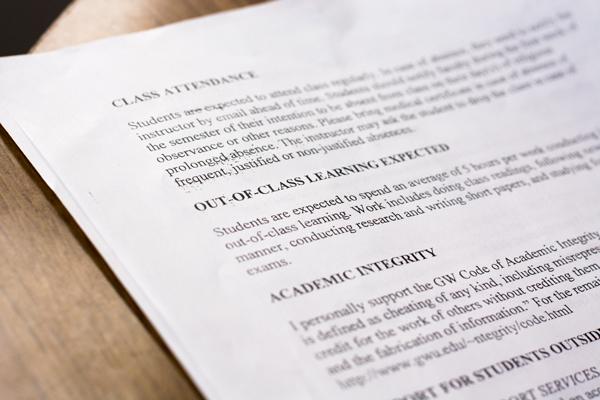Updated: Sept. 13, 2016 at 11:10 a.m.
Students this semester have noticed a new section on their syllabi: the minimum number of hours they are expected to spend on coursework in and out of class.
Officials and faculty members recommended a policy this summer that asks professors to include the minimum numbers of hours students are expected to spend on each course outside of the classroom on their syllabi. This new policy is in response to updated requirements from the University’s accrediting agency, which is set to review GW in 2018, University spokeswoman Maralee Csellar said in an email.
As the University begins its reaccreditation process, officials have been working on adhering to the requirements set by the Middle States Commission on Higher Education, the agency that accredits GW. One of the requirements is proving that a course adheres to the U.S. Department of Education’s definition of a course hour, which includes the specific number of hours students are expected to spend in and out of class, Csellar said.
“These general guidelines are just that: general and guidelines. But they should give students a sense of how much time they should plan to commit to courses,” Csellar said. “They are also a reminder to faculty about how much work they should expect of their students.”
Csellar said what constitutes a course hour has changed as new types of courses, like online courses, increase in popularity. Accrediting bodies are more likely to request documentation of the ways in which a university’s courses follow the course hour definition, she said.
Officials formed a committee with faculty representatives from each of GW’s 10 schools over the summer to create a policy that follows the U.S. Department of Education’s definition of course hours. The policy is now being “vetted” by a variety of University groups, she said.
The Faculty Senate has previously passed a resolution asking professors to upload syllabi for courses so that students could know courses’ basic expectations before registering, at the urging of student leaders.
Harvey Feigenbaum, a professor of political science and international affairs, said in an email that including this information on syllabi probably won’t impact how much time students actually spend on coursework.
It’s hard to estimate the number of hours students will work outside of class because it varies depending on the subject and individual students’ work habits, he said.
“Most students can judge for themselves how much work is involved simply by reading the syllabus,” Feigenbaum said. “I guess more information never hurts, but I don’t think the information will be all that reliable.”
Other faculty members said students can benefit from the information when they begin courses.
Patricia Phalen, the assistant director of the School of Media and Public Affairs, said in an email that the information is useful because it shows students how much time and attention they will have to commit to a class.
“The information would have been helpful for me in college,” Phalen said. “It gives a benchmark so students will know that if they aren’t putting in those hours they probably won’t do well in the course.”
Murli Gupta, the chair of the mathematics department, said in an email that faculty generally understand that including course hours is a new federal requirement, and faculty have just begun implementing it. He added that it could be useful for students who actively consider the hours listed.
“It is useful for the students who are diligent and who plan their time carefully,” Gupta said. “Many, though, would ignore this as they ignore other important things.”
Sadie Ruben contributed reporting.







